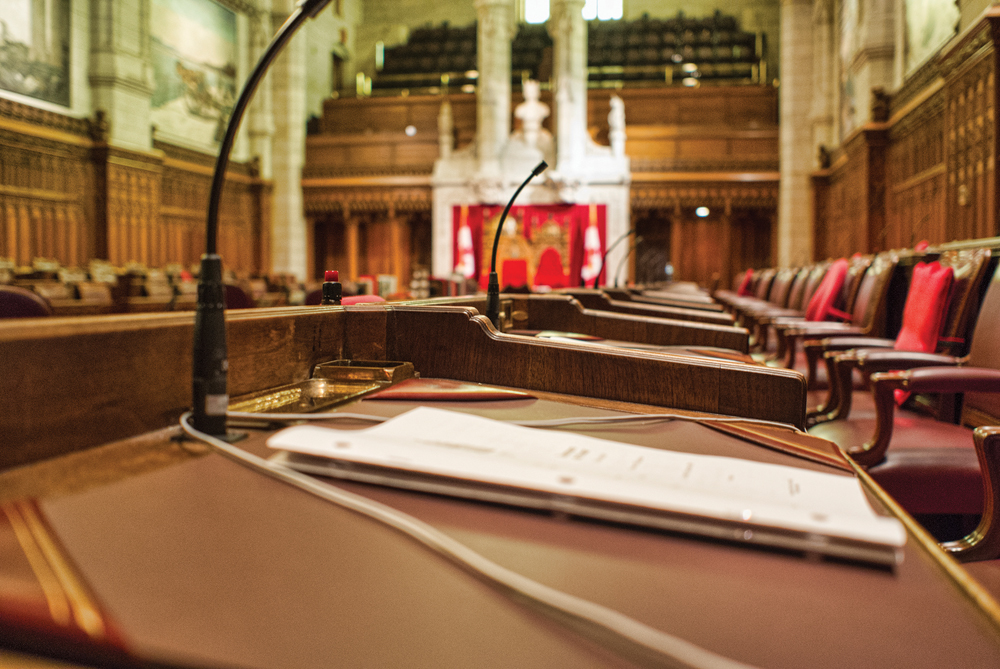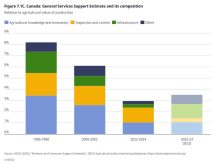Liberals are defending their pet policy while Conservatives are seeing blood in the electoral waters, likely leaving farmers holding the bag on Bill C-234, analysts say.
“The ones who get hurt by this are farmers,” said Dave Carey, vice-president of government and industry relations with the Canadian Canola Growers Association.
Why it matters: Bill C-234 has faced headwinds in the Senate, including accusations of bullying between senators, while Conservatives in the House of Commons have accused the Liberals of manipulating the upper chamber.
Read Also

Trade uncertainty, tariffs weigh on Canadian beef sector as market access shifts
Manitoba’s beef cattle producers heard more about the growing uncertainty they face as U.S. tariffs, and shifting trade opportunities, reshape their market.
Senate proceedings extended for weeks, with bill proponents accusing Liberal-aligned and bill-critical senators of delay tactics. Several changes to the bill had been proposed, defeated and then reintroduced through largely similar amendments during that time.
At time of writing, Bill C-234, which originally proposed to exempt propane and natural gas used for grain drying, barn and greenhouse heating from the price on carbon, had been amended to cut out heating for buildings and was in its third reading in the Senate.
That amendment evoked consternation among agriculture groups and senators aligned with the bill. They expressed fear that, as it will now return to the House of Commons for further debate, the bill will die on the order paper.
Another amendment, which would cut a sunset clause that would see the exemption reassessed at the end of eight years, was also tabled Dec. 7. The amendment would reduce the clause to three years.
“In my view, Bill C-234 is not good public policy,” said Senator Yuen Pau Woo, who introduced the amendment, saying it would bring the bill in line with the deadline for the exemption on heating oil, announced earlier this fall.
Senator David Wells, who sponsored the bill in the Senate, spoke in opposition to the amendment. He said that, while in committee debates in the House of Commons, MPs had agreed to reduce the sunset clause from 10 years to eight.
“There was no debate at committee on that in the other place, and they all agreed that eight years was fair,” Wells said. “Now we’re hearing from Senator Woo that not 10 years, not eight years, but three years is fair.”
On Dec. 11, it became the second amendment to pass on the bill. Senators voted 44-40 in favour.
In response, the National Farmers Union released a statement calling for the bill to be passed.
Former NFU vice-president Glenn Wright said that, while the NFU supports a price on carbon in general, farmers don’t have viable alternatives for drying grain.
“Because farmers are so climate-dependent—so vulnerable—it is in farmers’ interests that Canada and all nations reduce emissions as quickly as possible. Canada’s pollution-pricing system is a crucial part of that effort,” he said. “In this one case, however, because there are no alternative grain drying options for farmers, a temporary exemption is the right policy.”
He also said an amendment to remove an exemption on fuels for building heating creates a “pressing need” for financing and incentives for farmers to adopt more efficient heating options.
“The NFU recognizes that farmers can improve building efficiency and switch heating sources to clean technologies like heat pumps, but these renovations are capital intensive and farmers will need extensive financial support to decarbonize the heating of barns and greenhouses,” he said.
Rising heat
The temperature around the bill rose when it hit the Senate, said Carey. He has been heavily involved in supporting the bill as co-chair of the Agricultural Carbon Alliance, a coalition of farm groups.
Carey said they had expected opposition in the House of Commons. However, the bill passed there with support from the Conservatives, NDP and Bloc Quebecois. It got little attention, he added. It wasn’t discussed during question period and neither the prime minister nor opposition leader focused on it.
Ag groups weren’t seeking to make the bill a partisan issue. After all, the Liberals initially exempted most farm fuels from the carbon price, said Carey.
“We intentionally remained non-partisan,” he said. “This has never been an existential debate about climate change, the price of carbon or ‘is the carbon tax a legitimate mechanism to combat climate change?’”
Now, that’s how the bill is being debated, he said.
Carey pointed to fallout from the Liberal’s plan to exempt home heating oil from the price on carbon, a move this fall that drew ire as it was seen to benefit mainly Atlantic Canada and cater to voters the Liberals would like to court.
Prior to that announcement, Carey said he was getting some calls from media. Afterward, he was suddenly on CBC’s The National.
Political analyst Shannon Sampert also made the connection between the Liberals’ need to defend their carbon policy and the woes of Bill C-234.
With COP28 climate discussions in Dubai, Liberals are feeling the pressure of not meeting climate goals, Sampert said. If they want to maintain their vote with climate-focused demographics, they have to move ahead with environmentally positive programming.
“[The Liberals are] constantly being forced to play defence,” said Sampert. “[Conservative leader Pierre] Poilievre is getting far too many speaking points on it … it’s just another agenda item they publicly do not want to deal with.”
For Conservatives, this is an opportunity to stump up votes on the Prairies, Sampert added.
Bipartisan bad behavior
The Liberal government has said it hasn’t pressured senators to vote a certain way on Bill C-234.
While speaking to the Senate during question period on Nov. 22, Environment and Climate Change Minister Steven Guilbeault didn’t deny he’d spoken to senators about the bill.
“There’s a world of difference between talking to someone and pressuring or whipping them into doing something or voting in a certain way,” he said.
Poilievre also accused the prime minister of contacting and pressuring senators on the bill. Those comments led up to Conservative efforts to delay the House of Commons agenda Dec. 7 with prolonged voting in reaction to what was happening in the Senate with Bill C-234.
“I’ve got news for Justin Trudeau,” Poilievre said. “You’ve ruined Christmas for Canadians. Common sense Conservatives are going to ruin your vacation as well.”
Poilievre promised that his party would present long lines of amendments until the Liberals “agree to our demand to take the tax off farmers, First Nations and families.”
The Conservatives have also been applying pressure in the Senate, Sampert said. She pointed to bullying accusations against certain Conservative senators; accusations that have been sent to the chamber’s ethics committee.
On Dec. 5, Senate Speaker Raymonde Gagné ruled that some Conservative senators’ actions had constituted intimidation, a decision related to a question of privilege raised over actions that occurred Nov. 9.
The issue centres on allegations that, after debate on the bill had been abruptly adjourned, Senator Don Plett berated two colleagues over their motion to end the debate. Plett later apologized for those actions.
Other Conservative senators shared social media posts that reportedly encouraged people to call and harass senators Bernadette Clement and Chantal Petitclerc, the two said.
Gagné added that unspecified senators had threatened colleagues with other penalties if they did not “give way and concede to a particular outcome.” This included threats of blocking work in committee or the chamber.
“This is the new normal,” Sampert said.
Shoe on the other foot
Delay tactics in the Senate are not new, she added. She pointed to a Dec. 1 article by CBC political analyst Aaron Wherry, which said a Liberal bill to change the words of the national anthem spent 19 months in the Senate before it passed.
Wherry was referring to Bill C-210, an Act to Amend the National Anthem Act (Gender), which passed in early 2018.
Wherry also noted the Conservatives, including their Senate leader, Don Plett, have been accused of similar delay games in cases like Bill C-69, which includes a measure on federal assessment processes for energy projects.
A June 2019 Globe and Mail article quoted Plett as saying, “Yeah, we tried to slow Bill C-69 down. We don’t like the bill.”
Wherry added that government interference to kill a private members bill also has precedent. In 2010, Conservative senators moved to defeat Bill C-311, a climate change-related private member’s bill put forward by the NDP that had already passed the House of Commons, Wherry wrote.
Jack Layton, NDP leader at the time, levied similar accusations of Senate manipulation against former prime minister Stephen Harper.
Back on Bill C-234, Carey said agriculture groups will work with the bill’s sponsor, MP Ben Lobb, to further it in the House of Commons.
Editor’s note: The amended bill cleared the Senate Dec. 12 and is headed back for another round in the House of Commons.
















